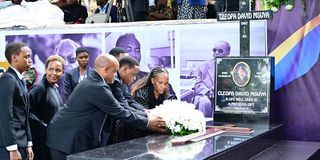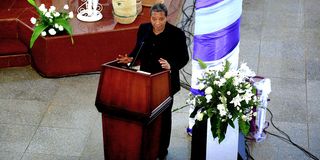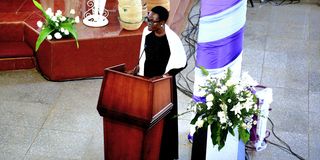Msuya, force behind Tanzania’s economy reforms, laid to rest

Family members place a wreath on Cleopa David Msuya's grave in Mwanga, Kilimanjaro on May 13, 2025. PHOTO | STATE HOUSE
What you need to know:
- “Mzee Msuya was not just a government official, he was a visionary. He guided Tanzania’s economy through extremely difficult times, when shortages were rampant, foreign exchange was scarce, and the economy had entered negative growth,” Former President Jakaya Kikwete.
Dar es Salaam. Former First Vice President and Prime Minister Cleopa David Msuya was laid to rest on Tuesday at his home village of Chomvu, with President Samia Suluhu Hassan and former President Jakaya Kikwete describing the deceased as the “guru of Tanzania’s economic transformation.”
Mr Kikwete, who served as Tanzania’s President from 2005 to 2015, recalled Msuya’s central role in steering the nation through one of its most challenging post-independence periods.
In a reflective tribute following the veteran leader’s passing, Mr Kikwete highlighted Msuya’s leadership during the economic liberalisation of the late 1980s and early 1990s.
“Mzee Msuya was not just a government official, he was a visionary. He guided Tanzania’s economy through extremely difficult times, when shortages were rampant, foreign exchange was scarce, and the economy had entered negative growth,” said Mr Kikwete.
Although trained as a social worker, Msuya gained both national and international acclaim for his grasp of economic policy and fiscal discipline. He served three terms as minister for Finance—twice under the late Mwalimu Julius Nyerere and once under President Ali Hassan Mwinyi.
“Despite not being an economist by training, he handled the finance docket with the poise and expertise of a seasoned professional. He was exceptionally intelligent—what many would call a ‘big brain’,” said Mr Kikwete.
At a time when Tanzania faced critical shortages of essential goods, surging inflation, and rationing, Msuya led efforts to implement reforms that, though painful, were deemed necessary. According to Mr Kikwete, a defining moment came in 1990 when Tanzania resumed negotiations with the International Monetary Fund (IMF) and the World Bank.
These discussions had stalled under President Nyerere due to ideological differences, particularly over socialism and self-reliance.
As a member of the ruling CCM’s National Executive Committee (NEC), Msuya had to persuade sceptical colleagues of the need for economic change.

Mr Kikwete, also an NEC member at the time, recalled that Msuya was nicknamed ‘Bwana IMF’ by critics.
“He never got angry. He stood his ground and kept explaining why reforms were vital. With Nyerere’s reluctant blessing, the country shifted towards a market economy. It came at a great personal cost to Mzee Msuya, but he carried the burden with humility,” added Mr Kikwete.
President Samia also reflected on the turbulent reform period, recalling CCM-led demonstrations in Zanzibar opposing the devaluation of the Tanzanian shilling.
“We sang, ‘Msuya, usiruhusu shilingi yetu kushushwa thamani,’” she said, referencing the protest song. “But the devaluation proceeded. However, Tanzania eventually overcame inflation and shortages,” added President Hassan.
She credited the deceased with pioneering the country’s transition to a market-based economy, despite facing resistance from politicians, donors, and sections of the business community.
“Msuya was instrumental in opening up our economy to the private sector. As President Kikwete once explained, his work laid the foundation for Tanzania’s future growth,” she said.
The Head of State also recalled his crucial role in financing liberation struggles in southern Africa when serving as the Finance Ministry’s permanent secretary.
Mr Msuya helped secure Chinese funding for the Tanzania-Zambia Railway Authority (Tazara). Even after retirement, Mr Msuya remained an adviser to national leaders.
“I was one of the beneficiaries of his wisdom,” said President Samia, who first met him during her 2015 parliamentary campaign in Mwanga.
In his later years, Msuya became a vocal advocate for regional development projects, especially the Same-Mwanga-Korogwe water and road initiatives commitments President Samia pledged to honour. She hailed Msuya as a devoted public servant who gave his life to the nation.
Born in 1931 in Chomvu Village, Usangi, Mwanga District in Kilimanjaro Region, Msuya began his career in 1956 as a community development officer and ended in 2021 when he retired as Board Chair of Ardhi University.
He was also Tanzania’s longest-serving minister for Finance, holding the post from 1972 to 1975, 1983 to 1985, and 1985 to 1990.
Although his tenure as Prime Minister and First Vice President lasted just 11 months, President Hassan pointed out that Msuya was the last to serve under the old system before the 1995 introduction of the multi-party framework, which merged the presidency and vice-presidency under a joint ticket.
The Chief Justice, Prof Ibrahim Juma, described Msuya’s life as one spanning Tanzania’s political evolution—from independence through socialism, economic liberalisation, and into the digital era.
“He was never rigid. He embraced change, supported private enterprise, and championed investment. These are the values we remember him for,” said Prof Juma.
Speaker of the National Assembly Dr Tulia Ackson said Parliament remains guided by Msuya’s legacy as a lawmaker and national leader.

“We continue to learn from his words and deeds. As we bid him farewell, let us reflect on the kind of legacy we, too, wish to leave,” she said.
In a moving tribute, the late leader’s son, Mr Job Msuya, spoke about the impact his father had on their family.
“He never gave us money, but he gave us his values. He taught us self-reliance,” he said, adding that mourners from across the world had gathered in Usangi to pay their respects.




